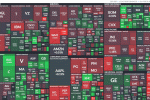The rise in the exchange rate in emerging markets was short-lived due to high inflation

exchange rate emerging: By Vuyani Ndaba and Vivek Mishra JOHANNESBURG/BENGALURU (Reuters) – Battered emerging market currencies will struggle to hold on to recent gains towards year-end as U.S. Federal Reserve interest rate hikes and inflation concerns keep the dollar in the forefront, a Reuters poll found.
JOHANNESBURG/BENGALURU (Reuters) – Battered emerging market currencies will struggle to hold on to recent gains towards year-end as U.S. Federal Reserve interest rate hikes and inflation concerns keep the dollar in the forefront, a Reuters poll found.
Barely recovering from a nearly two-year bear run, positive sentiment in emerging market currencies has already been soured by higher U.S. Treasury yields.
Last month, safe-haven dollar inflows pushed the emerging markets currency index to its weakest level since end-2020. But it recovered after markets scaled back somewhat on aggressive Fed hike bets, weakening the greenback.
A majority of FX strategists in the May 30-June 1 poll said the dollar’s recent weakness would be short-lived and it would strengthen against most emerging market currencies by end-August.
“It has been a perfect storm for EM local markets in 2022 – a hawkish Fed, the Russia-Ukraine conflict, the Russian debt sell-off and a China slowdown,” said Min Dai, FX strategist at Morgan Stanley.
“While we … hoped at the start of the year that EM could recover in 2022 after a painful 2021, the reality is the opposite.”
exchange rate emerging
Almost all past emerging market crises were linked to dollar strength. As the dollar rises, developing countries must tighten monetary policy to head off falls in their own currencies. Not doing so would exacerbate inflation and raise the cost of servicing dollar-denominated debt.
“The EM story won’t turn constructive unless U.S. inflation starts to turn. Valuations are cheap and positioning is clean, but this is not sufficient for investors to turn constructive,” Dai said.
The dollar index strengthened on Wednesday as Treasury yields climbed and worries over a further acceleration in global inflation kept investors’ risk appetite at bay.
Societe Generale’s Phoenix Kalen said the spectre of high and sticky inflation amid a choppy global growth outlook is likely to haunt markets during the near term.
That will offer limited opportunities for emerging market assets to decisively break out of recent ranges.

STABLE OUTLOOK
“The fate of a broad range of EM currencies will be tied to CNY’s (Chinese yuan) behavior in the coming period. Asia FX and EM commodity currencies such as Latam FX and ZAR (South African rand) remain susceptible to near-term weakness, due to their linkages with CNY,” Kalen added.
South Africa’s rand has taken on a somewhat stable outlook in comparison to other EM currencies. The high-yielding rand was expected to erase most of its gains made so far this year in the next three months, falling more than 2.0% to 15.65/$.
Turkey’s lira is down nearly 20% this year, in addition to the 44% it lost last year, as Turkey’s central bank slashed interest rates even as inflation was soaring. Inflation is expected to reach 76.55% in May.
The lira, the worst-performing emerging market currency this year, is set to fall about 9% to 18.00/$ in the next 12 months.
Russia’s rouble, which was propped up by capital controls and had artificially risen to become the world’s best-performing currency so far this year, is expected to weaken more than 20% to 76.67/$ in a year.
Not all is well in Asia, either. China’s tightly-controlled yuan was predicted to depreciate 1.0% to 6.71 per dollar in a year as analysts warned a shrinking yield gap between Chinese and U.S. 10-year government bonds could trigger capital outflows.
The Indian rupee, which hit a record low of 77.73 versus the dollar last month, was expected to hit a fresh low of 78/$ in the next six months.
(Reporting by Vivek Mishra and Vuyani Ndaba; Polling by Anant Chandak and Md Manzer Hussain; Editing by Ross Finley and David Holmes)





